By Emily Hanna

Hello! My name is Emily Hanna and I am an enthusiastic member of the Engaged Citizen Corps (ECC) here at Drake University. As a part of the Engaged Citizen Corps I get to take service-learning specific classes and have an internship as a first-year college student! (And write this amazing blog post!)
The organization I am working for is HOME, Inc., or Home Opportunities Made Easy Incorporated. HOME, Inc. is focused around three main topics: revitalizing Des Moines neighborhoods, creating opportunities for quality affordable housing, and retaining housing through education and counseling. All in all, they help make sure people have homes, and are able to stay in them.
One of my jobs at HOME, Inc. is to create content for social media accounts. As a novice graphic designer, it is thrilling to be able to create posts and see how they look on Facebook. I created an Instagram page to attract a younger population to our resources and make sure we are consistently posting on social media. Coming this Spring, we are revamping the 15-year-old website. My job is to look through the data and make sure that all the information can be found online in a simple and effective way.
The saying of being an intern can be true when it comes to my job once in awhile. No, I have not gone on any coffee runs yet, but I have spent a good amount of time with the copier. I find myself creating a lot of packets for our RentWise program- a series of classes for the community to learn how to be a responsible and wise renter- and building folders full of information for our new homeowners.
As a part of my job, I get to spread the message of our mission: revitalizing, creating opportunities, educating, and counseling, and that is amazing. I have learned so much about landlord and tenant rights and responsibilities, something I would have not thought about. I have been able to rewrite brochures that help people know their legal rights through the Housing and Urban Development (HUD), which has been an experience that has opened my eyes to struggles that people face.
A fun part of the job I was able to experience was attending a task force meeting. A variety of representatives from different nonprofits in Des Moines came together to tackle the problems released prisoners face when they re-enter society. There are multiple difficulties former convicts face, mainly employment, education, and housing. After listening to many professionals speak, I gained the sense of how vital and important housing is. Through this meeting and the work I have done at HOME, Inc. I have learned that housing is vital to a successful life. Without housing what does one have? This is a question that continues to bounce around my head as I take my law classes, and when I took an ECC course talking about dignity.
The entire Engaged Citizen Corps program has been a blast. I would say life-changing, inspirational, eye-opening, or motivating, but they sound too cheesy. I’d say if you could google positive adjectives, every single one would be a word I would describe ECC. What I learned in my First Year Seminar (FYS) class was the definition of service-learning. Not just the google definition, because you don’t need a class to learn that. But the concept and real-life practice of service-learning.
As a class, we would read a chapter of a book, discuss it, practice it, and then reflect on it. That, that long process is what I call service-learning. I find it so fascinating that I can go through that process to not only help others, but to make myself a better person.
Because of this program I am a better person. And it is not just because I am now an expert copy maker, or that I accumulated 130 followers on the HOME, Inc. Instagram. But, it is because I understand what service-learning is, how to treat people with dignity, how important housing is, and how to think on both sides of an issue.
I am so thankful for this program, for HOME Inc., and for you, who made it to the end of this blog,
Best wishes,
Emily Hanna
P.S. I would not be doing my job right if I did not publicize HOME, Inc. (Facebook and Instagram @homeincdsm)!

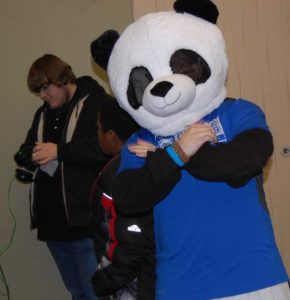 What is randomness? We all have some preconceived notion for what it means, but how does one describe it mathematically? The purpose of this J-Term (The Many Faces of Randomness) was to look at a few uses for concept of randomness, and determining what, if anything unifies them. We started out by analyzing card games, dice rolls, and coin flips. We then moved on to discussing some of the common perceptions and fallacies regarding randomness. These fallacies usually arise when people attempt to find patterns in random sequences. They range from the semi-rational “hot hand fallacy” (when a player of a particular sport seemingly increases their odds for making a shot based on their previous shots that game), to the almost entirely irrational “gamblers fallacy” (when a person is playing a game of chance and determines that, due to previous failures, they are due for a win). After touching on these topics, we moved deeper into the mathematics behind randomness. We discussed many concepts including entropy, determinism, random number generators, Kolmogorov complexity, and much more. So, I think it is safe to say that we didn’t spend the entire time drawing cards and flipping coins.
What is randomness? We all have some preconceived notion for what it means, but how does one describe it mathematically? The purpose of this J-Term (The Many Faces of Randomness) was to look at a few uses for concept of randomness, and determining what, if anything unifies them. We started out by analyzing card games, dice rolls, and coin flips. We then moved on to discussing some of the common perceptions and fallacies regarding randomness. These fallacies usually arise when people attempt to find patterns in random sequences. They range from the semi-rational “hot hand fallacy” (when a player of a particular sport seemingly increases their odds for making a shot based on their previous shots that game), to the almost entirely irrational “gamblers fallacy” (when a person is playing a game of chance and determines that, due to previous failures, they are due for a win). After touching on these topics, we moved deeper into the mathematics behind randomness. We discussed many concepts including entropy, determinism, random number generators, Kolmogorov complexity, and much more. So, I think it is safe to say that we didn’t spend the entire time drawing cards and flipping coins.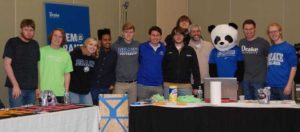
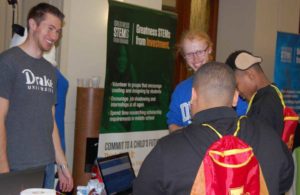
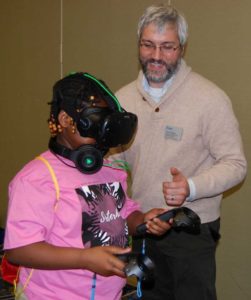
 As an Engaged Citizen Member, I have been paired with Iowa Homeless Youth Centers (IHYC), a non-profit that works to end the cycle of homeless and promote independence through assistance and support. IHYC works primarily with the ages of 16-22 with direct assistance in the areas of education, employment, safe housing, positive community engagement, and life skills. There are several programs instilled at IHYC in order to achieve the youth’s goals within the said areas including the Youth Opportunity Center, Post-Secondary Education Retention Program (aka PSERP), counseling, Street Outreach, and Emergency Beds. The Youth Opportunity Center is a safe-space where youth can have a warm meal, use computers, socialize with others, and relax. Meanwhile, PSERP works closely with the youth as a form of support while achieving a higher education. Several of the youth utilize the counselor, while even more participate in Street Outreach, a program in which every other weekend, members and volunteers of IHYC bring survival packs to people experiencing homeless. Finally, the Emergency Beds are available for up to 10 youth, in which they can reside for a short amount of time while they work with IHYC’s staff to figure out their next steps. Needless to say, IHYC is dedicated to helping the youth reach a level of self-sufficiency.
As an Engaged Citizen Member, I have been paired with Iowa Homeless Youth Centers (IHYC), a non-profit that works to end the cycle of homeless and promote independence through assistance and support. IHYC works primarily with the ages of 16-22 with direct assistance in the areas of education, employment, safe housing, positive community engagement, and life skills. There are several programs instilled at IHYC in order to achieve the youth’s goals within the said areas including the Youth Opportunity Center, Post-Secondary Education Retention Program (aka PSERP), counseling, Street Outreach, and Emergency Beds. The Youth Opportunity Center is a safe-space where youth can have a warm meal, use computers, socialize with others, and relax. Meanwhile, PSERP works closely with the youth as a form of support while achieving a higher education. Several of the youth utilize the counselor, while even more participate in Street Outreach, a program in which every other weekend, members and volunteers of IHYC bring survival packs to people experiencing homeless. Finally, the Emergency Beds are available for up to 10 youth, in which they can reside for a short amount of time while they work with IHYC’s staff to figure out their next steps. Needless to say, IHYC is dedicated to helping the youth reach a level of self-sufficiency.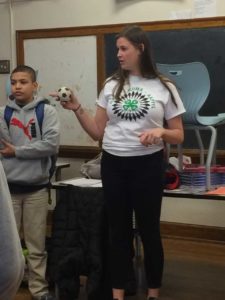 During my time so far at 4-H, I have had the opportunity to work with multiple afterschool programs in Des Moines including Hillis Elementary, Harding Middle School, and Callanan Middle School. I am so blessed to be able to work with such a diverse amount of kids coming from all types of backgrounds. This has helped increase my awareness and ability to work in situations that aren’t necessarily in my comfort zone. I am grateful to be able to work in such an inclusive community. In addition to working with a number of schools I had the opportunity to participate in the 4-H Ujima Retreat at the beginning of my service, which was an awesome experience where African/African American and Asian/Asian-Pacific Islander students were exposed to what higher education is and the doors it could open. I plan to do a lot more during my time with 4-H, including more afterschool programs, retreats, and creating a joint service project with a few Drake organizations such the APO Service Fraternity and Hillis Elementary.
During my time so far at 4-H, I have had the opportunity to work with multiple afterschool programs in Des Moines including Hillis Elementary, Harding Middle School, and Callanan Middle School. I am so blessed to be able to work with such a diverse amount of kids coming from all types of backgrounds. This has helped increase my awareness and ability to work in situations that aren’t necessarily in my comfort zone. I am grateful to be able to work in such an inclusive community. In addition to working with a number of schools I had the opportunity to participate in the 4-H Ujima Retreat at the beginning of my service, which was an awesome experience where African/African American and Asian/Asian-Pacific Islander students were exposed to what higher education is and the doors it could open. I plan to do a lot more during my time with 4-H, including more afterschool programs, retreats, and creating a joint service project with a few Drake organizations such the APO Service Fraternity and Hillis Elementary.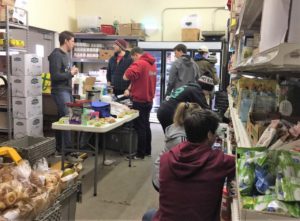
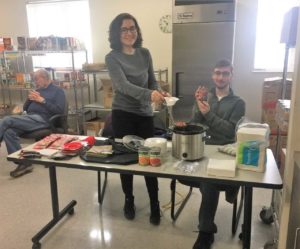
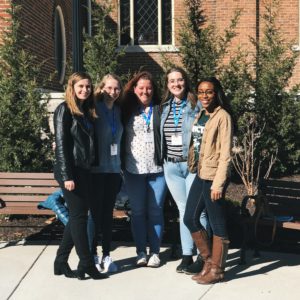
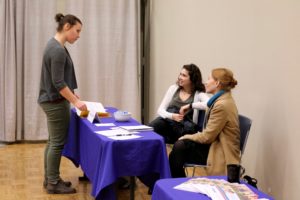 These “livelihoods” that I describe are often wrongly stereotyped especially within Anawim’s tenant basis. Though these people may be experiencing drug addictions, alcoholism, single parenthood, etc., they are not lazy, helpless scum. They are just people who have been bogged down by society’s unequal distribution of resources. With a deepening gap between the haves and the have nots, they feel the inescapable burden the most. Non-profits like Anawim are designed to provide opportunities to those who might not otherwise get the chance. But, it is important to note, that even Anawim’s programs do not extend to everyone. These man-made boundaries put people at risk for an on-going cycle of self-hatred and frustration. I regret to say that it is this that results in giving up. In doing so, people experiencing homelessness accept the wrongly attributed labels and become what they are described. This is not their fault. It is ours – for not speaking up or changing our language (one of the most powerful tools we have).
These “livelihoods” that I describe are often wrongly stereotyped especially within Anawim’s tenant basis. Though these people may be experiencing drug addictions, alcoholism, single parenthood, etc., they are not lazy, helpless scum. They are just people who have been bogged down by society’s unequal distribution of resources. With a deepening gap between the haves and the have nots, they feel the inescapable burden the most. Non-profits like Anawim are designed to provide opportunities to those who might not otherwise get the chance. But, it is important to note, that even Anawim’s programs do not extend to everyone. These man-made boundaries put people at risk for an on-going cycle of self-hatred and frustration. I regret to say that it is this that results in giving up. In doing so, people experiencing homelessness accept the wrongly attributed labels and become what they are described. This is not their fault. It is ours – for not speaking up or changing our language (one of the most powerful tools we have).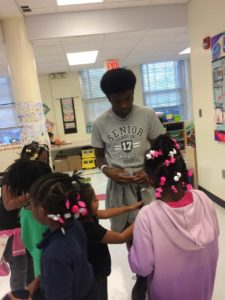 I work with the different programs that CFUM has to offer, such as their K-5 programs, Gender-Specific programs, and community engagement programs. While working with the K-5 programs and Gender Specific programs I help clean the classrooms, prepare snack for the children, plan enrichment activities, help with homework, and monitor the children’s whereabouts. I understand that when working with children one needs a lot of patience and truthfulness, especially when there are continuous conflicts: the children fighting with one another, children misplacing items, not listening to me or the other adults, and not wanting to participate in academic studies. Truthfulness allows me to render genuine answers to the recipients about school and life. They understand that they can trust me as an ally and someone to look to for advice, particularly towards college. However, I do run into questions about the possibility of hard work and personal struggles inhibiting them from wanting to go to school, which is why I also work in the community program section of CFUM for their Grit Program. But, before I attempted to manage the Grit program, I had to apply the concepts I was taught in the ECC program.
I work with the different programs that CFUM has to offer, such as their K-5 programs, Gender-Specific programs, and community engagement programs. While working with the K-5 programs and Gender Specific programs I help clean the classrooms, prepare snack for the children, plan enrichment activities, help with homework, and monitor the children’s whereabouts. I understand that when working with children one needs a lot of patience and truthfulness, especially when there are continuous conflicts: the children fighting with one another, children misplacing items, not listening to me or the other adults, and not wanting to participate in academic studies. Truthfulness allows me to render genuine answers to the recipients about school and life. They understand that they can trust me as an ally and someone to look to for advice, particularly towards college. However, I do run into questions about the possibility of hard work and personal struggles inhibiting them from wanting to go to school, which is why I also work in the community program section of CFUM for their Grit Program. But, before I attempted to manage the Grit program, I had to apply the concepts I was taught in the ECC program.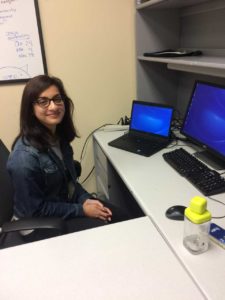 Hello, my name is Sabrina Uddin and I am a first year student at Drake University from the Chicago area. As a member of the
Hello, my name is Sabrina Uddin and I am a first year student at Drake University from the Chicago area. As a member of the